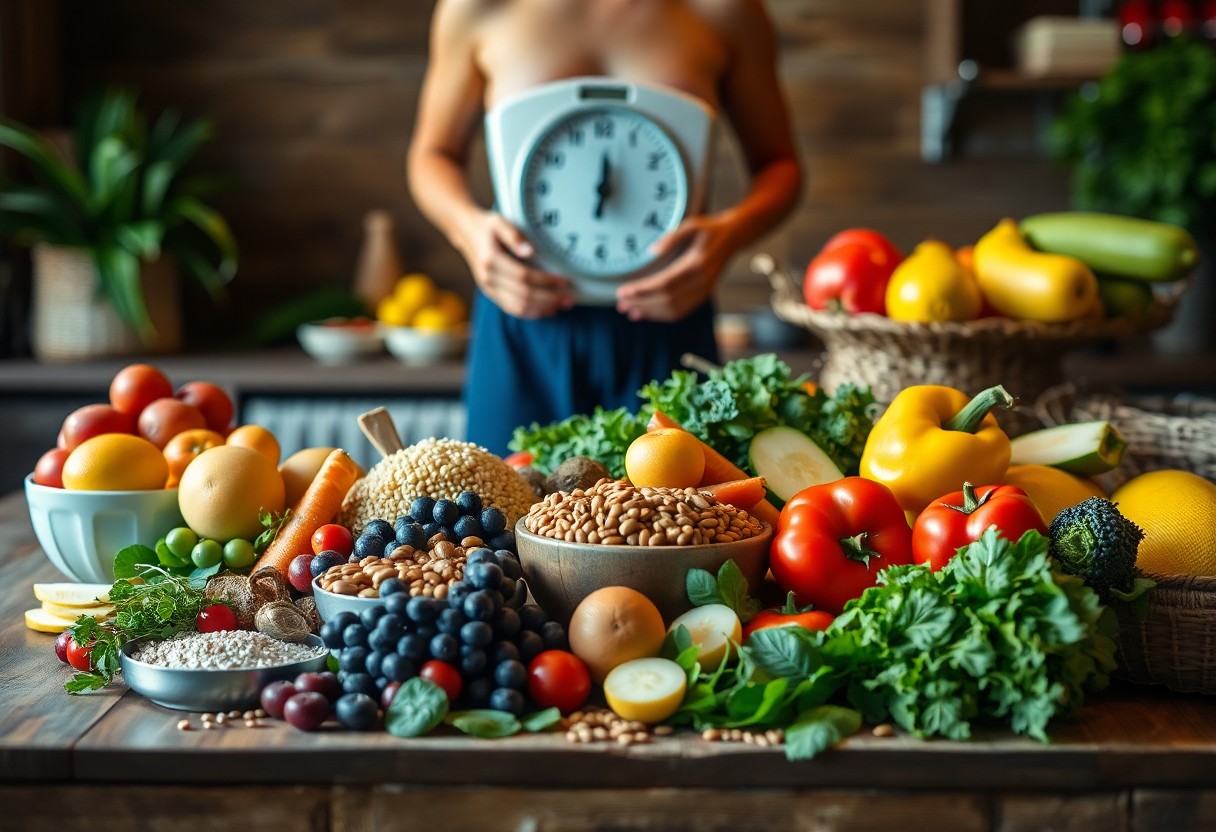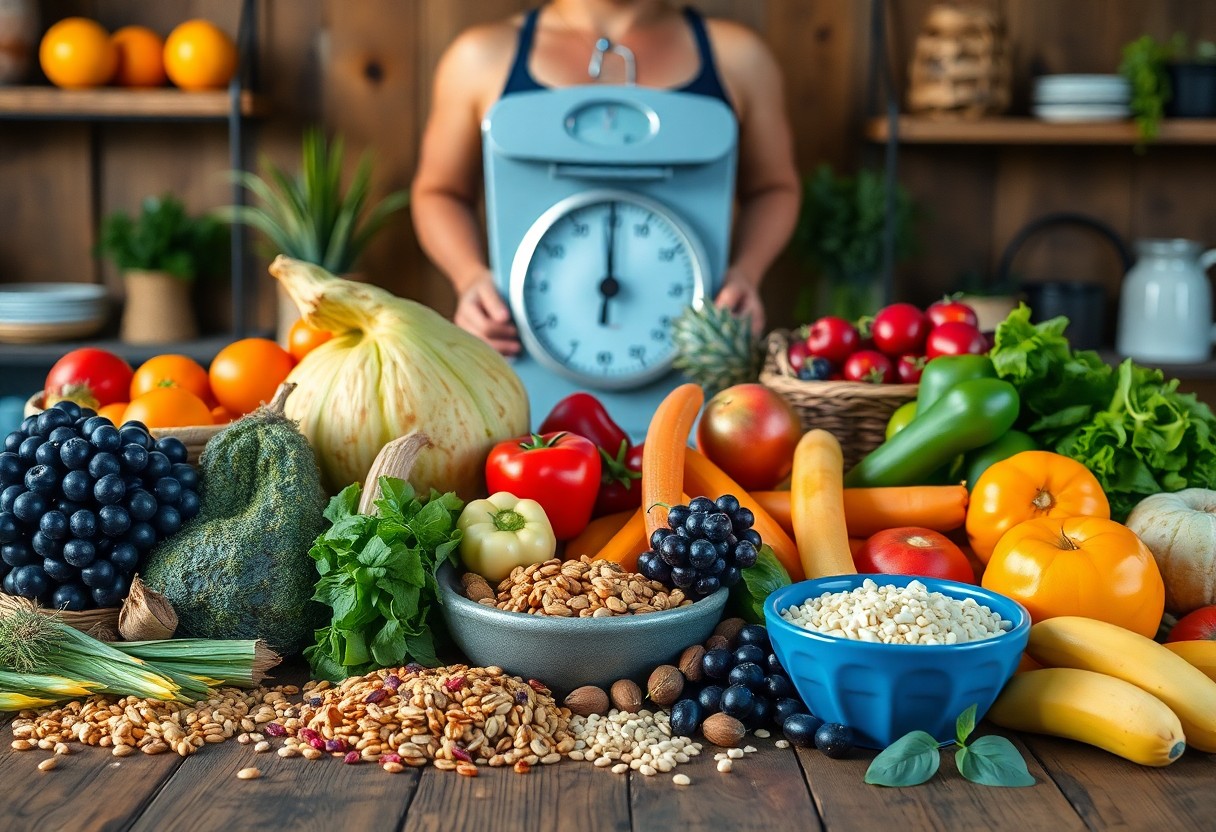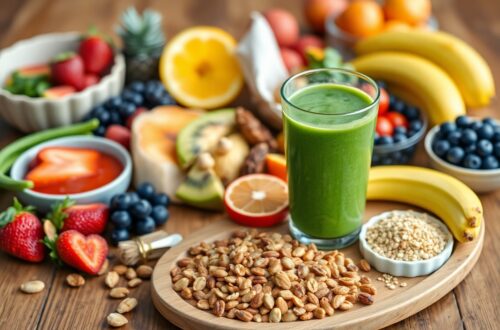Most people struggle to find a weight loss plan that works long-term. A plant-based diet could be your solution. By focusing on whole foods like fruits, vegetables, legumes, and grains, you can not only shed pounds but also improve your overall health. This diet is not just about losing weight; it promotes a balanced lifestyle. In this post, we will explore how a plant-based diet can help you achieve and maintain your weight loss goals sustainably.
Key Takeaways:
- A plant-based diet is rich in fruits, vegetables, whole grains, and legumes, which are low in calories but high in nutrients. This makes it easier to consume fewer calories while feeling full.
- Plant-based foods are often high in fiber, which aids digestion and helps control hunger, leading to sustainable weight loss.
- Eating more plant-based meals can reduce your environmental impact, making it a healthier choice for both you and the planet.

What is a Plant-Based Diet?
While many people think of a plant-based diet as just vegetarian or vegan, it actually encompasses a variety of eating styles focused on plant foods. This dietary approach emphasizes fruits, vegetables, whole grains, legumes, nuts, and seeds while reducing or eliminating animal products. A plant-based diet can help you enjoy a diverse range of flavors while supporting your health and the environment.
Definition and Types
To understand a plant-based diet, you should know that it can vary from person to person. Here’s a quick overview of different types:
| Type | Description |
| Vegetarian | Excludes meat, but may include dairy and eggs. |
| Vegan | Excludes all animal products. |
| Flexitarian | Mainly plant-based but occasionally eats meat or fish. |
| Whole-Food Plant-Based | Focuses on whole, unprocessed plant foods. |
| Raw Vegan | Includes only raw plant foods that haven’t been cooked. |
Knowing these types allows you to choose an approach that fits your lifestyle and goals.
Common Foods Included
Plant-based diets focus on foods that come from plants. You will find plenty of delicious and healthy options. Here are some common foods included in this diet:
Even within a plant-based diet, you can enjoy a wide range of foods. Think of fruits like apples and bananas, vegetables like broccoli and spinach, whole grains such as quinoa and brown rice, legumes like lentils and chickpeas, and a variety of nuts and seeds. These foods are rich in nutrients and can help you feel full and satisfied while promoting sustainable weight loss. By incorporating these items into your meals, you’re making positive changes for your health and the planet.
Benefits of a Plant-Based Diet for Weight Loss
Some of the main benefits of a plant-based diet include effective weight loss, better overall health, and improved energy levels. By choosing whole, plant-based foods, you can nourish your body while shedding extra pounds. These foods are often more filling and help you stay satisfied longer, making it easier to stick to your weight-loss goals.
High Fiber Content
Above all, one significant advantage of a plant-based diet is its high fiber content. Foods like fruits, vegetables, and whole grains are packed with fiber, which keeps you full for longer periods. This helps control your appetite and reduces the likelihood of overeating, supporting your weight loss efforts.
Low in Calories
To achieve weight loss, focusing on foods low in calories is important. A plant-based diet typically includes a variety of low-calorie options, making it easier for you to manage your calorie intake without feeling deprived. This helps you create a calorie deficit necessary for losing weight.
For instance, many fruits and vegetables contain fewer calories per serving compared to high-calorie processed foods. This means you can eat larger portions and feel satisfied while still being mindful of your calorie count. Foods like leafy greens, cucumbers, and berries can fill your plate, offering nutrients and fiber without adding extra calories. By incorporating these options into your meals, you’ll support your weight loss journey effectively.

How a Plant-Based Diet Supports Sustainable Weight Loss
Keep in mind that a plant-based diet can help you achieve and maintain weight loss in a healthy way. This approach focuses on whole foods, like fruits, vegetables, grains, and legumes. These foods are typically lower in calories but high in nutrients. By choosing a variety of plant-based options, you can reduce your calorie intake while still feeling full and satisfied. This balance is key to long-term weight management.
Nutritional Balance
Before you look into a plant-based diet, it’s crucial to ensure that your meals are nutritionally balanced. This means including all the necessary nutrients, like proteins, healthy fats, vitamins, and minerals. You can achieve this by eating a wide range of plant foods. Incorporate beans, nuts, whole grains, and colorful vegetables in your meals. This variety will not only keep your meals interesting, but it will also support your weight loss goals by giving your body what it needs.
Long-Term Lifestyle Change
The shift to a plant-based diet promotes lasting lifestyle changes that support sustainable weight loss. By adopting this eating pattern, you are likely to develop healthier habits over time. Instead of following quick-fix diets that can be harmful, you’ll make mindful choices that benefit your health in the long run. Over time, these choices can lead to better weight management and improved overall health.
Indeed, embracing a plant-based lifestyle allows you to enjoy food while making healthier choices. Research shows that those who commit to this diet not only lose weight but also maintain their results. By focusing on nutrient-rich foods, you can change your relationship with food. You’ll start to appreciate the flavors and benefits of whole, unprocessed ingredients. This can lead to a more satisfying and health-conscious way of living, making it easier to stick with your weight loss journey.

Overcoming Challenges when Transitioning to a Plant-Based Diet
Your journey to a plant-based diet can come with its fair share of challenges. It’s important to understand that many people face similar hurdles when making this transition. From finding adequate meal options to addressing social situations, these challenges can seem overwhelming. However, with the right mindset and preparations, you can make this process smoother and more enjoyable.
Common Obstacles
Obstacles often include limited food choices, lack of inspiration for meals, social pressure, and concerns about nutritional balance. You might worry about missing out on your favorite foods or feel unsure about where to start. These concerns are common and can be addressed with a few strategies that will empower your choice to go plant-based.
Tips for Success
An effective way to ensure a successful transition to a plant-based diet is to plan ahead. Here are some tips to keep you on track:
- Start by slowly incorporating more plant-based meals into your week.
- Explore new recipes to keep meals exciting and enjoyable.
- Connect with others who share your goals for added support.
Thou can take advantage of community resources like cooking classes or online forums to enhance your experience.
Transitioning to a plant-based diet can seem daunting, but with a few thoughtful strategies, you can make it a positive experience. It helps to keep these tips in mind:
- Focus on whole foods instead of processed options for better health.
- Make a shopping list to avoid impulse buys that may not align with your goal.
- Stay open to trying new foods and flavors for variety.
Thou may find that embracing new ingredients can lead to delightful meals that are both healthy and satisfying.
Research and Evidence Supporting Weight Loss Benefits
After examining various studies, it’s clear that a plant-based diet can aid in sustainable weight loss. Research shows that these diets typically include low-calorie, nutrient-rich foods. This combination helps you feel full while consuming fewer calories. As a result, many people experience weight loss without feeling deprived. Incorporating more fruits, vegetables, and whole grains into your meals can lead to healthier eating habits and long-term weight management.
Scientific Studies
On reviewing multiple scientific studies, you’ll find strong evidence that plant-based diets promote weight loss. One study revealed that people following a vegan diet lost more weight than those on conventional diets. Another research highlighted that individuals who ate more plant foods had lower body mass indexes (BMIs). These findings suggest that a dietary shift toward plants can make a real difference in your weight and overall health.
Expert Opinions
Supporting this view, nutrition experts frequently advocate for plant-based eating as an effective weight loss strategy. Dietitians emphasize that these diets provide crucial nutrients while being lower in calories. They recommend incorporating a variety of plant foods to not only support weight loss but also enhance overall health.
Loss of excess weight is often linked to the increased intake of fiber found in plant-based foods. Experts highlight that fiber keeps you full longer, reducing cravings and unhealthy snacking. They suggest making gradual changes to include more vegetables, legumes, and whole grains in your meals. This way, you can create a sustainable eating pattern that supports weight loss and improves your well-being.
Practical Tips for Adopting a Plant-Based Diet
Unlike traditional diets that focus on restriction, a plant-based diet emphasizes whole foods and variety. Here are some practical tips to help you adopt this lifestyle:
- Start slow by adding more fruits and vegetables to your meals.
- Try new plant-based recipes to keep meals interesting.
- Focus on whole grains, legumes, nuts, and seeds for imperative nutrients.
- Be mindful of food labels to avoid hidden unhealthy ingredients.
Recognizing the benefits of a plant-based diet can lead you to healthier choices and even aid in obesity treatment. For more insights, check out this article on plant-based diet for obesity treatment.
Meal Planning and Preparation
About meal planning and preparation: think of it as your roadmap to success. Set aside time each week to plan your meals. Create a shopping list based on your meal ideas. This practice helps you stay on track and reduces the temptation to grab unhealthy snacks.
Finding Support and Resources
PlantBased support can make your transition easier. Seek out online communities, forums, or local groups focused on plant-based nutrition. These platforms offer advice, recipes, and encouragement from others who share your goals.
But don’t just stop at finding groups. Seek out resources such as cookbooks, blogs, and videos that focus on plant-based eating. Connecting with like-minded individuals can help you stay motivated. Engaging with others can also boost your confidence in trying new foods and recipes. Take advantage of the wealth of available information to make informed choices.
Summing up
Hence, adopting a plant-based diet can significantly support your weight loss journey while promoting sustainability. By incorporating more fruits, vegetables, and whole grains into your meals, you can enjoy lower calories and higher nutrients. This approach not only helps you shed pounds but also reduces your carbon footprint. Embracing this lifestyle can lead to lasting health benefits and a positive impact on the environment, making it a win-win for you and the planet.
FAQ: How a Plant-Based Diet Supports Sustainable Weight Loss
Q1: What is a plant-based diet?
A: A plant-based diet focuses on eating whole, unprocessed foods that come from plants. This includes fruits, vegetables, whole grains, legumes, nuts, and seeds. While some people on a plant-based diet might choose to include small amounts of animal products, most consume very little or none at all.
Q2: How can a plant-based diet help with weight loss?
A: A plant-based diet can support weight loss in several ways. First, plant-based foods are generally lower in calories than meat and processed foods. They also tend to be high in fiber, which helps you feel full longer. This can reduce the amount of food you eat overall, leading to weight loss.
Q3: Are there any important nutrients I might miss on a plant-based diet?
A: Yes, while a plant-based diet can be very healthy, it’s important to make sure you get enough of certain nutrients. These include protein, iron, vitamin B12, calcium, and omega-3 fatty acids. You can find these nutrients in plant sources, like beans, leafy greens, nuts, and fortified foods. If needed, consider taking supplements.
Q4: Is a plant-based diet suitable for everyone?
A: A plant-based diet can be suitable for most people, but individual needs vary. It’s wise to plan your meals carefully to ensure you’re meeting your dietary needs. If you have specific health conditions or dietary requirements, talking to a healthcare provider or nutritionist before making big changes is a good idea.
Q5: What are some easy ways to start a plant-based diet?
A: Here are some simple steps to start a plant-based diet:
- Begin with one meatless meal each day.
- Try new plant-based recipes to keep meals exciting.
- Replace processed snacks with fruits, vegetables, or nuts.
- Gradually increase your intake of whole grains and legumes.
- Join online communities for support and recipe ideas.
By taking small steps, you can transition into a plant-based diet smoothly and enjoy its benefits for weight loss.





